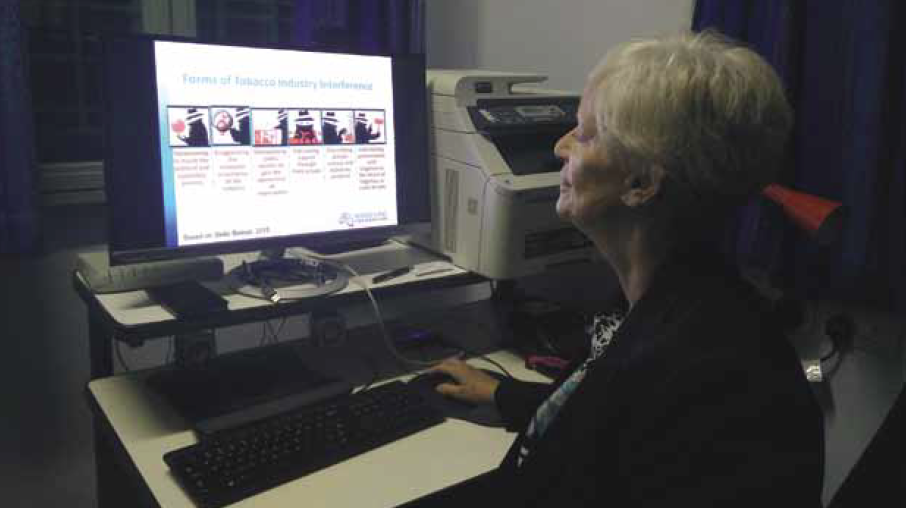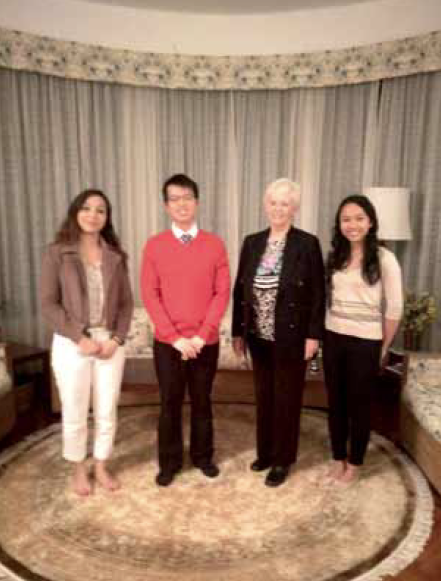© Hong Kong Academy of Medicine. CC BY-NC-ND 4.0
DOCTOR FOR SOCIETY
From the fringes of public health to the forefront of the fight against tobacco: Dr Judith Mackay
Zareen Chiba, Khin-Shwe Eu, Edward Tam
Year 4, Faculty of Medicine, The University of Hong Kong
Global health circles, through resolutions and
campaigns, have announced that this is the decade
of non-communicable disease, of gender equality,
and of trade-related aspects of health. However, it
was one advocate, a female British physician from
Hong Kong, who was to become one of the few
visionaries who saw and fought for these pertinent
issues decades before the big chambers of the World
Health Organization.
Dr Judith Mackay, SBS, OBE, JP, received her
medical education at the University of Edinburgh
and moved to Hong Kong in 1967, and spearheaded
Hong Kong’s anti-tobacco movement. She cites
three main reasons for making the shift from clinical
medicine to public health advocacy. During her
work as a physician in the 1970s and 1980s, she felt
that clinical work was “like a band-aid”, a step too late
in preventing morbidity and mortality, and did not
address the cause of many hospitalisations at the time.
Second was her fundamental belief that women’s
health involved much more than gynaecological and
birth control issues, and that female smoking-related
morbidities were far more significant than perceived.
This was pertinent as women were being pushed into
the advertising spotlight by the tobacco industry at a
time and in a region where the majority of smokers
were men. What finally galvanised her crusade to
combat tobacco use in Hong Kong was what she
described as “the wrath of the tobacco industry” that
descended upon her after the publishing of relevant
op-eds* in the South China Morning Post in the
1980s.
*An op-ed, or opinion editorial, is a narrative essay that presents
the writer’s opinions or thoughts about an issue. Op-eds are
often appear opposite of the editorial page of newspapers and
magazines. They can raise awareness about a particular topic.
Gender and global health
Dr Mackay recounts the challenges she initially faced
when donning the mantle of a public health policy-maker:
the tobacco industry had already established
its foothold in national trade and local mindsets, and
her work was initially very much a “fringe activity”
with little structure, support, and virtually no pay. A
pioneer in her field, Dr Mackay and her work were
rapidly recognised: by 1989, she was in high demand
and inundated with requests from governments of
other Asian countries for advice on how to initiate
tobacco reform. Governments could see that the
extended trade and political nuances of tobacco
issues required them to ratify her suggestions for
tobacco control. That same year Dr Mackay founded
the Asian Consultancy on Tobacco Control, and to
this day she serves as its director.
As her influence grew, Dr Mackay was also able
to push for equal gender representation in public
health policy-making; when invited to counsel the
10th World Conference on Tobacco or Health held
in Beijing in 1997, she stipulated that she would
work pro bono so long as at least half of the keynote
plenary speakers, chairmen, and committee were
female. Despite initial hesitation from organisers,
the event turned out to be the “best conference ever”
and set the standard for subsequent conferences to
follow the goal of gender equality in conferences
and smart legislation. “I really promote women [in
the selection of awards] because if women are not in
those positions, then the issue of women in tobacco
gets ignored.” In other international events, and
with the understanding that “women get forgotten
and sidelined” among discussions of health data and
demographics, she also advocated for the separation
of data collected on women and children to ensure
the proper representation of women in tobacco
and health-related studies in a manner that would
provide specific solutions to both demographics.
Influential and dangerous
On a global front, Dr Mackay is senior advisor to
the World Lung Foundation and the World Health
Organization Tobacco Free Initiative. She adopts a
pragmatic and conscientious approach in assisting
regional leaders to combat tobacco, taking small
steps at a time. Quoting her, “Foreign countries
seem to like me; I don’t come in and tell them what
to do”. Claiming that ‘should’ is not a word in her
vocabulary, Dr Mackay believes the ultimate goal is
for regional countries (especially low- and middle-income
nations, Big Tobacco’s new targets of recent
decades) to become empowered, to learn to stand up
for themselves, and to not legislate in a submissive
manner with respect to multinational industry.
When asked what she believes to be her
most meaningful achievement, Dr Mackay humbly
responded that no single accolade was most
significant, although she did say her culminating
personal achievement was being named in 2007
as one of TIME magazine’s “100 most influential
people in the world”. However, she wears no greater
badge of pride than being named one of the three
most dangerous people to the Big Tobacco. This
exemplifies her efforts in 200 papers and 460
addresses to tobacco control conventions as a job
well done, and that she and public health are worthy
adversaries of one of the most aggressive industries
in the world. In recognition of her work, Dr Mackay
has also recently received an Honorary Degree from
Hong Kong Shue Yan University—the first medical
doctor in Hong Kong to have been thus honoured
since the institution was established.
A not-so hazy future
Looking to the future, Dr Mackay is optimistic about
the outlook for global anti-tobacco efforts. To this
day, her three main commitments in tobacco control
are to empower women, ensuring that they are not
neglected and pushing for gender equality; to assist
low- and middle-income countries; and to ultimately
bring the fight to the tobacco industry. Her wishes for
the near future, locally, are to see China implement
a national smoke-free law and for the Hong Kong
SAR Government to set up legislation to involve and
incentivise owners of entertainment establishments
in the enforcement of smoke-free zones. In keeping
with modern trends, she also holds strong opinions
on the rising popularity of e-cigarettes and shisha
as alternative forms of tobacco consumption,
and acknowledges such habits as a challenge to
legislation and smoking cessation. Thus, timely is her
contribution to the 5th edition of The Tobacco
Atlas, her 10th health atlas, a document filled with
infographics and explanations of the wide spillover
influence of the tobacco epidemic on international
politics, trade, health, and the environment. With
her maxim “If you can’t measure it, you can’t manage
it”, she contributed with the aim to gather good data,
to best inform and inspire action in the reader.
She currently resides with her loving husband,
also a doctor, in Hong Kong, and finds time to
practise tai chi and collaborate on new health atlases
while remaining more than ever an enthusiastic
activist and inspiration to public health circles. She
has no plans of slowing down, emphasising that she
is merely doing “more of the same”, adding that “I’m
going to be working when I’m a hundred years old.”
In this first HKMJ issue of 2016, we wish her every
success in her future campaigns, and hope that her
dedication and triumphs over powerful adversaries
can inspire a future generation of public health
advocates to confront the vital challenges of global
health.



